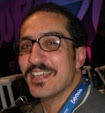Satisfaction
Martin Debattista, MaltaMedia's Editorial Director, has also been a leading technology columnist for various Maltese newspapers and magazines for more than 10 years. Today his report/comments about the Google.com.mt incident from last week appeared in The Times of Malta. I am one of the people he quotes in his article.
Martin's article in The Times is too short to fully contextualize my comments about hackers. So, I'm using my blog to elaborate on the matter in hope that people who disagree with my comments can see where I'm coming from.
According to Google, the obscene words that appeared on Google.com.mt last week were not placed there by a hacker but by a prankster who had lawful access to what appears on the Google.com.mt website.
Any prankster on the internet is a hacker in my book. Hackers are not to be confused with crackers, i.e. people who have malice or crime as their ultimate goal. All crackers are also hackers but fortunately not all hackers are crackers. By this estimation the Google prankster is a hacker even though there was no unlawfully crack on any system or server owned by Google. The prankster is a hacker because the message "search" was hacked into something other than what it was meant to be by Google.
Incidentally, this broader understanding of hacking is supported by several decades of hacker culture, which is documented in books and online resources. The following are my favourite books on the subject:


















Well I think it's obvious by now that the main culprit was someone who acceded to the frontpage text through the Translation Service. I gave plenty of reasons in my blog entry re: the matter. Cracking (i.e. what people usually understand by "hacking") through the Google system is a rather difficult feat in my books. If you're able to break through their security, you would already be employed at the Googleplex by now anyways.
I find the reaction of the father quoted in the article to go a bit overboard. If he's so concerned with such 'obscenities' he shouldn't let his "teenage daughter" ride the Maltese buses because I can guarantee him she'll be hearing far worse obscenities. Apart from the fact that she may not be as innocent as he wants her to be and she may probably already knows every possible application of that "obscene phrase".
My point being: it's Malta, you have to get used to this kind of stuff. Anzi, thank God the Maltese presence on the internet is still decent.
Judging from comments I've received on and off the blog regarding how to define a hacker, I must say that I'm shocked at the effect the popular press/media have had on the public understanding of what consitutes hacking. All those years of calling crackers hackers has clearly given hacking a bad name! I refuse to see hackers and hacking as bad, evil, or negative. Cracking is the dark side of hacking. Cracking is (and should remain) illegal. Hacking should be encouraged and taught in schools.
Anyone who disagrees with my broader view of hacking should really read one of the books I recommended on my original post. They are quite different from each other, but each one uses the term hacker to denote much more than someone who does illegal things on networks, servers and/or computers. My definition of "hacker" comes from a historical and ethical position.
It seems that this was carried out by someone who had access to the translation service - as already stated. Most probably to show off.
The problem is that anyone can gain access to the translation service!
Post a Comment
<< Home